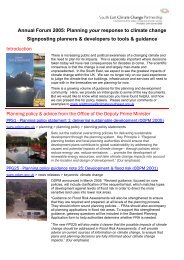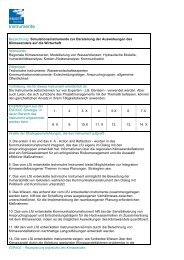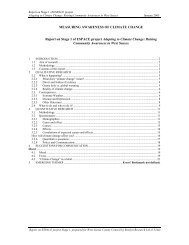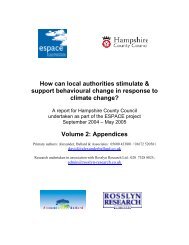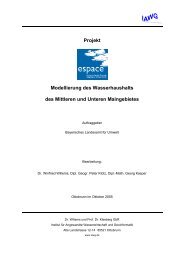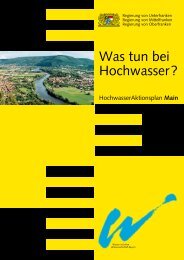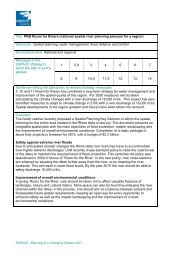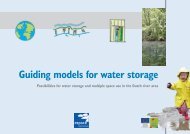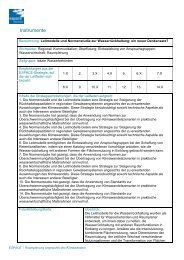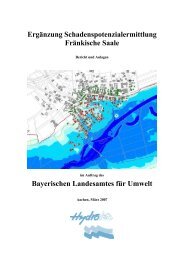Climate Change and the European Water Dimension - Agri ...
Climate Change and the European Water Dimension - Agri ...
Climate Change and the European Water Dimension - Agri ...
Create successful ePaper yourself
Turn your PDF publications into a flip-book with our unique Google optimized e-Paper software.
environmental <strong>and</strong> socio-economic changes. There are eleven projects integrated to<br />
<strong>the</strong> CatchMod cluster at <strong>the</strong> moment (Blind, 2004).<br />
<strong>Climate</strong> impact is specifically analysed within <strong>the</strong> project CLIME (<strong>Climate</strong> <strong>and</strong> Lake<br />
Impacts in Europe; EVK1- CT- 2002 - 00121). The CLIME project aims to assess <strong>the</strong><br />
direct <strong>and</strong> indirect effects of changes in <strong>the</strong> wea<strong>the</strong>r on <strong>the</strong> dynamics of lakes.<br />
Particular attention is paid to water quality variables that are used as diagnostic<br />
elements in <strong>the</strong> <strong>Water</strong> Framework Directive. Many water quality problems that were<br />
once thought to be due to local factors are now known to be influenced by variations<br />
in <strong>the</strong> wea<strong>the</strong>r that operate on a global scale. If present trends continue, changes in<br />
<strong>the</strong> wea<strong>the</strong>r will have a major effect on <strong>the</strong> dynamics of lakes throughout Europe. In<br />
winter, <strong>the</strong> most pervasive effects are those associated with <strong>the</strong> North Atlantic<br />
Oscillation but some important summer effects are related to <strong>the</strong> north-south<br />
movements of <strong>the</strong> Gulf Stream in <strong>the</strong> Atlantic.<br />
Ano<strong>the</strong>r research programme especially relevant to <strong>the</strong> EU <strong>Water</strong> Framework<br />
Directive is <strong>the</strong> EURO - LIMPACS (http://www.eurolimpacs.ucl.ac.uk/) project funded<br />
by <strong>the</strong> EU <strong>and</strong> designed to assess <strong>the</strong> effects of future global change on Europe’s<br />
freshwater ecosystems. The work program will include <strong>the</strong> direct impacts of climate<br />
change as well as its interactions with hydromorphology, eutrophication, acidification,<br />
<strong>and</strong> toxic substances. Some of <strong>the</strong> key hypo<strong>the</strong>ses checked within this project are:<br />
1. Global change may cause hydromorphological deterioration of a water body<br />
through intensification of l<strong>and</strong>-use or through a more variable discharge<br />
regime that results in habitat modifications <strong>and</strong> losses;<br />
2. Alternatively, global change may cause significant improvement if, for<br />
example, human disturbances are withdrawn from floodplains due to more<br />
frequent flood events or as a result of floods that generate a near-natural<br />
habitat structure.<br />
3. Increased temperature will interact with continued high nutrient loading to<br />
lakes that will increase <strong>the</strong> severity of eutrophication symptoms to an extent<br />
greater than that expected from natural fluctuations in climate.<br />
4. Predicted prolonged low-flow periods for stream <strong>and</strong> floodplain systems will<br />
increase denitrification <strong>and</strong> sedimentation rates <strong>and</strong> that increased winter<br />
flows will enhance <strong>the</strong> deposition of sediment-associated nutrients <strong>and</strong><br />
nitrogen removal rates.<br />
5. The impact of climate change on acidification recovery is dependent on<br />
hydrological <strong>and</strong> hydrochemical processes at <strong>the</strong> catchment scale.<br />
6. Future climate change will influence <strong>the</strong> distribution patterns <strong>and</strong> mobility of<br />
organic pollutants <strong>and</strong> toxic metals (e.g., lead, cadmium, mercury) in<br />
freshwater systems <strong>and</strong> lead to changes in <strong>the</strong> uptake <strong>and</strong> accumulation of<br />
<strong>the</strong>se substances in freshwater food chains. The cycling <strong>and</strong> fate of both<br />
organic <strong>and</strong> inorganic pollutants is intrinsically linked to <strong>the</strong> C cycle <strong>and</strong><br />
trophic status. <strong>Climate</strong> change influenced eutrophication will alter <strong>the</strong><br />
biogeochemical cycles <strong>and</strong> bioavailability of <strong>the</strong>se contaminants.<br />
142



